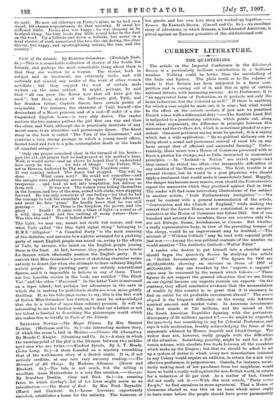CURRENT LITER A.T U RE.
THE QUARTERLIES.
The article on the Imperial Conference in the Edinburgh Review is a particularly brilliant contribution to a brilliant number. Nothing could be better than the marshalling of the facts and figures. The plain truth as to tho volume of trade is that Britain has been subjected to a fierce com- petition and is coming out of it, and this in spite of certain national defects, with increasing success. As to Preference, it is "an aggravated form of Protection, as it protects not only the home industries, but the Colonial as well." If there is anything for which a case might be made out, it is wine ; but what would be the effect on the entente cordiale if just now we penalised French wines with a differential duty P—The Scottish Land Bill is subjected to a penetrating criticism, which points out, along with other arguments, the difference in principle between this measure and the Crofters Act, which is sometimes pleaded as a pre- cedent. One most pertinent saying must be quoted ; it is a saying which has a wide application : "By no political alchemy can we bring about a sound and permanent revival of rural life on any basis except that of efficient and successful farming." Unfor- tunately, there never was a House of Commons possessed with so fierce a passion for change, and so little instructed in economical principles. — In " Ireland—a Nation" are stated again—and they cannot be stated too often—the insuperable difficulties of any solution of the Home-rule problem. The Irish trouble is at present chronic, but he would be a poor physician who should apply a treatment that would make it immediately fatal. Happily, the danger has become more remote, even should the Protectionists repeat the manoeuvre which they practised against Peel in 1846. The reader will find some interesting illustrations of the subject in another article, "Irish Parliamentary Antiquities."—We must be content with a general commendation of the article, "Convocation and the Church of England," while making the remark that the Lower House, as now constituted, is as unrepre- sentative as the House of Commons was before 1832. Out of one hundred and seventy-five members, there are seventeen only who are not Bishops, Deans, Archdeacons, or Canons. But whether a really representative body, in view of the prevailing temper of the clergy, would be an improvement may be doubted.—The account of "William Cobbett" may be read with especial profit just now.—Among the non-political contents of the number we would mention "The Aesthetic Outlook—Walter Pater."






































 Previous page
Previous page